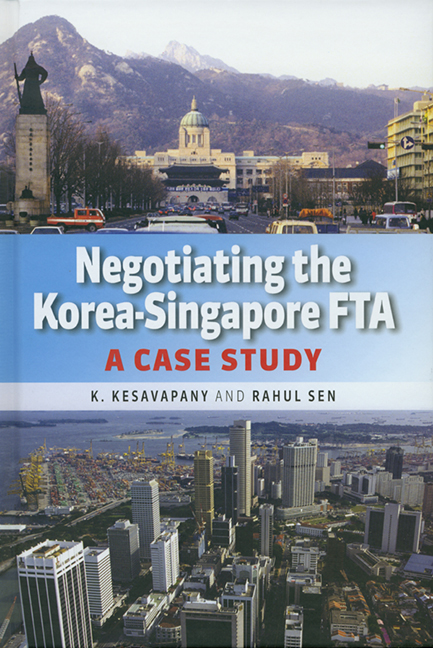Book contents
- Frontmatter
- Contents
- Foreword
- Preface
- 1 Background to the Korea-Singapore FTA
- 2 Singapore and Korea: Expanding Economic Linkages
- 3 Korea-Singapore Economic Relations After FTA: Towards a Mature Partnership
- 4 Salient Features of the KSFTA and Expected Benefits for Singapore
- 5 Singapore-Korea Business Linkages Post-KSFTA and Implementation
- 6 Concluding Remarks
- Notes
- References
- Appendix The Free Trade Agreement Between Korea and Singapore
4 - Salient Features of the KSFTA and Expected Benefits for Singapore
Published online by Cambridge University Press: 21 October 2015
- Frontmatter
- Contents
- Foreword
- Preface
- 1 Background to the Korea-Singapore FTA
- 2 Singapore and Korea: Expanding Economic Linkages
- 3 Korea-Singapore Economic Relations After FTA: Towards a Mature Partnership
- 4 Salient Features of the KSFTA and Expected Benefits for Singapore
- 5 Singapore-Korea Business Linkages Post-KSFTA and Implementation
- 6 Concluding Remarks
- Notes
- References
- Appendix The Free Trade Agreement Between Korea and Singapore
Summary
INTRODUCTION
After seven rounds of negotiations beginning in 2003, the negotiations for the KSFTA were substantially concluded in November 2004 after trade ministers from both countries met on the fringe of the ASEAN Summit in Vientiane, Laos. The agreement is currently enforced since March 2006.
The KSFTA is a comprehensive and highly substantive agreement, which is WTO-consistent in principles and WTO-plus in commitments. It aims to further enhance trade and investment flows between the two countries, bringing about a broadening and deepening of bilateral economic ties. The agreement covers diverse areas ranging from trade in goods, services and investments to that of competition policy, intellectual property protection, government procurement and other broad areas of economic cooperation.
The remainder of this chapter examines the salient features of the KSFTA by examining its provisions in the above areas, and attempts to also analyse the possible benefits for Singapore businesses and consumers.
TRADE IN GOODS
Under the KSFTA, 100 per cent of the Republic of Korea's (ROK's) exports will be allowed tariff-free entry into Singapore. Thus, Singapore will remove the remaining tariffs on alcoholic products immediately once the KSFTA comes into force.
Concomitantly, in case of Singapore's exports destined for Korea, up to 75 per cent of domestic exports valued at S$3 billion will enjoy immediate tariff elimination with the coming into force of the KSFTA. A further 14 per cent of domestic exports will also enjoy tariff-free access to the ROK market over the next ten years.
- Type
- Chapter
- Information
- Negotiating the Korea-Singapore FTAA Case Study, pp. 19 - 28Publisher: ISEAS–Yusof Ishak InstitutePrint publication year: 2007

